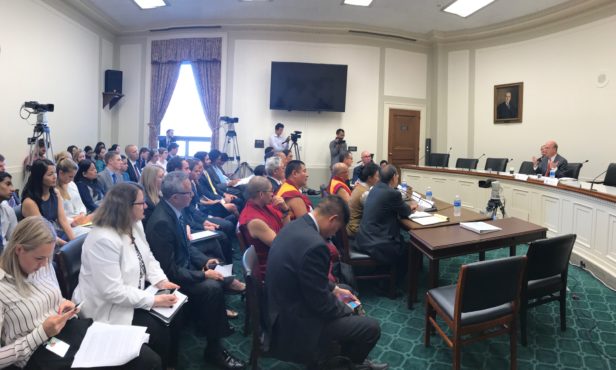
(TibetanReview.net, Jul14, 2017) – A hearing on the state of religious freedom in Chinese ruled Tibet was held on Jul 12 in the US Congress under the aegis of the Tom Lantos Human Rights Commission. The day marked the 2nd death anniversary of Tulku Tenzin Delek Rinpoche, a prominent religious leader, philanthropist and environmental activist targeted by China for his devotion to Tibet’s exiled spiritual leader, the Dalai Lama. China sentenced him to what eventually amounted to life sentence for alleged involvement in an unsolved bomb explosions incident.
Those who testified at the hearing included Dr Tenzin Dorjee, a Tibetan Commissioner in the US Commission on International Religious Freedom and an Associate Professor at the Department of Human Communication Studies at California State University, Fullerton; Arjia Rinpoche, a former Abbot of Kumbum Monastery in Qinghai Province and director of the Tibetan Mongolian Buddhist Cultural Center in Bloomington, Indiana; Nyima Lhamo, Niece of Tulku Tenzin Delek Rinpoche who recently fled her homeland; and Todd Stein, an expert on Tibetan Issues and former staff of the State Department.
In their Opening Statements, the Co-Chairs of the Commission, Congressmen Jim McGovern and Randy Hultgren, underlined the importance they attached to the overall Human Rights situation in Tibet in general and religious freedom in particular with specific cases.
The speakers testified on a range of issues pertaining to religious freedom having particular concern in Tibet today, including on policies and programs of the Chinese Government, the current status of the Panchen Gedun Choekyi Nyima who has been missing since his kidnap by the Chinese government in May 1995, issues related to the death of Tulku Tenzin Delek Rinpoche under questionable circumstances in a Chinese prison, on the question of the Dalai Lama’s return to Tibet, the massive Chinese government destruction at the Larung Gar Tibetan Buddhist centre in Sichuan Province carried out last year, and Release of Prisoners of Conscience and on Chinese government policy on the issue of reincarnations of Tibetan Buddhist masters.
The hearing was held in the Foreign Affairs Committee conference room. Those who attended it included many staffers of the members of the Commission and the State Department. The Office of Tibet, International Campaign for Tibet and Students for Free Tibet jointly helped to coordinate the hearing under the leadership of the Commission.


